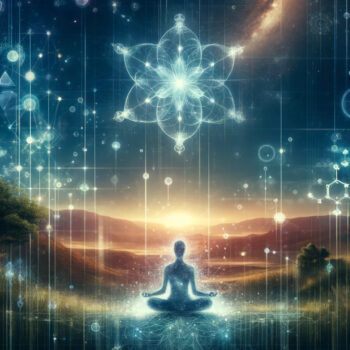By Dakota Flynn
Staff Writer for Wake Up World
Science and spirituality are often perceived as separate realms, with science rooted in the material world and spirituality in the non-material. However, as our understanding of the universe expands, these two seemingly distinct domains may not be as separate as once thought. This article explores the intersection of science and spirituality, examining the links between the physical and spiritual realms.
Introduction
[pro_ad_display_adzone id=”110028″]
Traditionally, science and spirituality have been viewed as opposing forces. Science focuses on objective, measurable phenomena, while spirituality deals with subjective, non-material experiences. Scientific discoveries challenge this dichotomy, suggesting a deeper intertwining of the physical and spiritual worlds. This article delves into the emerging field of spiritual science and its exploration of these connections.
The Emergence of Spiritual Science
Spiritual science, also known as consciousness science, is an interdisciplinary field that bridges the gap between science and spirituality. It draws upon physics, neuroscience, psychology, and philosophy to study consciousness and its relationship to the physical world.
Physicist and philosopher David Bohm, a pioneer in this field, proposed a new understanding of reality through his work on the implicate and explicate order, where consciousness plays a fundamental role in shaping the physical world. Biologist Rupert Sheldrake’s theory of morphic resonance suggests a collective memory influencing all living organisms.
Other notable contributors include Amit Goswami, a theoretical physicist known for his work on quantum mechanics and its implications for consciousness, and Stanislav Grof, a psychiatrist whose research on altered states of consciousness has provided insights into the spiritual dimensions of the mind.
The Nature of Consciousness
One of the key questions spiritual science seeks to answer is the nature of consciousness. Consciousness is a subjective experience that is difficult to define or measure. However, advances in neuroscience and quantum physics have provided new insights.
Integrated Information Theory (IIT), proposed by neuroscientist Giulio Tononi, suggests that consciousness arises from integrating information across different parts of the brain, indicating that consciousness exists in all living organisms to some degree. Quantum physics, particularly the theory of quantum entanglement, suggests that particles can connect in ways that transcend space and time, leading some scientists to propose that consciousness is a fundamental aspect of the universe.
Additionally, Roger Penrose and Stuart Hameroff’s Orchestrated Objective Reduction (Orch-OR) theory posits that consciousness arises from quantum processes within the brain’s microtubules. This theory bridges neuroscience and quantum physics, proposing that the brain’s complex structure facilitates quantum computation, giving rise to conscious experience.
The Relationship Between Consciousness and the Physical World
Spiritual science also explores the relationship between consciousness and the physical world. Traditionally, consciousness has been viewed as a byproduct of physical processes in the brain. However, discoveries in quantum physics challenge this view.
The observer effect in quantum mechanics suggests that the act of observation can affect the behavior of subatomic particles, implying that consciousness may influence matter at a fundamental level. Quantum biology explores the role of quantum mechanics in biological systems, proposing that quantum effects may be involved in processes such as photosynthesis and smell.
Moreover, the concept of non-locality in quantum physics hints at a universal consciousness that transcends individual minds, where particles remain interconnected regardless of distance. This idea resonates with ancient spiritual teachings, which have long suggested that all beings are interconnected through a vast, unseen web of consciousness.
The Implications of Spiritual Science
The emerging field of spiritual science has profound implications for our understanding of reality and our place in the universe. If consciousness is a fundamental aspect of the universe, it suggests that our experience is not limited to the physical realm. This opens up discussions about the afterlife and a greater non-material reality.
Spiritual science also potentially impacts various fields, including medicine, psychology, and environmental conservation. Understanding consciousness’s role in healing will lead to new approaches to treating physical and mental illnesses. For instance, practices like meditation and mindfulness, which have roots in spiritual traditions, are increasingly recognized for their health benefits and potential to positively alter brain function.
Recognizing the interconnectedness of all living things fosters a greater emphasis on environmental sustainability. Acknowledging that our consciousness is linked with the natural world will inspire a more harmonious and responsible approach to our environment, leading to practices that honor and protect the Earth.
Conclusion
The intersection of science and spirituality represents a fascinating area of research that challenges traditional views of reality. By studying spiritual science, we will better understand consciousness and its relationship to the physical world. This can impact various fields and lead to a greater appreciation of the interconnectedness of all things. Exploring the links between the physical and spiritual realms will help us understand our place in the universe and the true nature of reality.
As we continue to explore these connections, we will find that the boundaries between science and spirituality blur, revealing a more unified understanding of existence. This knowledge synthesis will lead to a more holistic worldview, where scientific inquiry and spiritual insight complement and enrich each other, paving the way for a deeper and more meaningful engagement with the mysteries of life.
Article Sources
- Bohm, D. Wholeness and the Implicate Order
- Sheldrake, R. The Science Delusion: Freeing the Spirit of Enquiry.
- Tononi, G. Consciousness as integrated information: a provisional manifesto. Biological Bulletin,
- Stapp, H. P. Mind, matter, and quantum mechanics. Springer Science & Business Media
- McFadden, J., & Al-Khalili, J. Life on the Edge: The Coming of Age of Quantum Biology.
About the Author
Dakota Flynn is an astrologer and spiritual writer known for melding astrology, tarot, and numerology mystical arts with practical guidance. Her insightful writings offer deep reflections on personal growth and cosmic connections, helping individuals navigate life’s journey with clarity and purpose. Dakota’s work serves as a beacon for those exploring the spiritual path, providing tools for empowerment and self-discovery.
[pro_ad_display_adzone id=”110027″]







